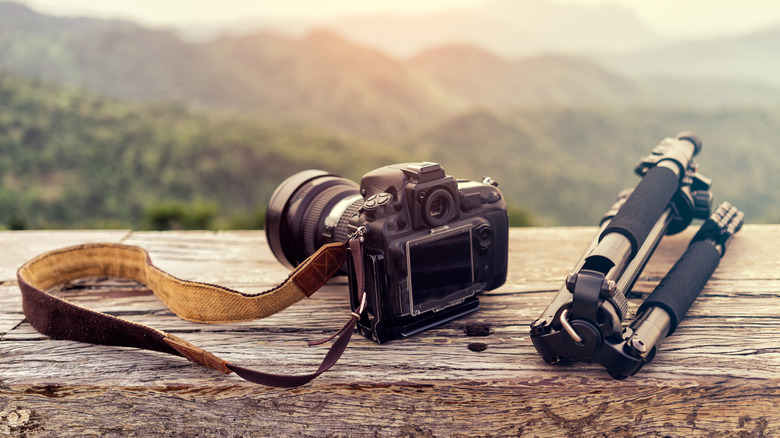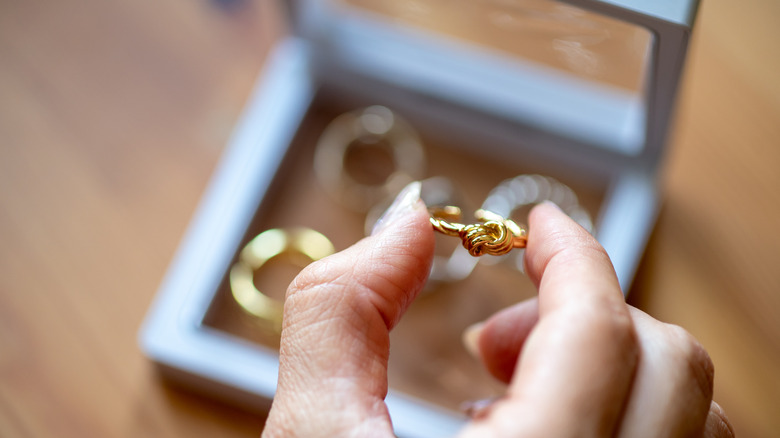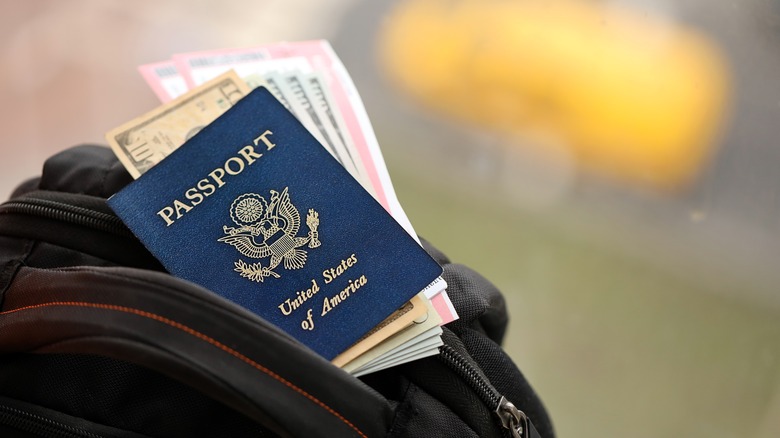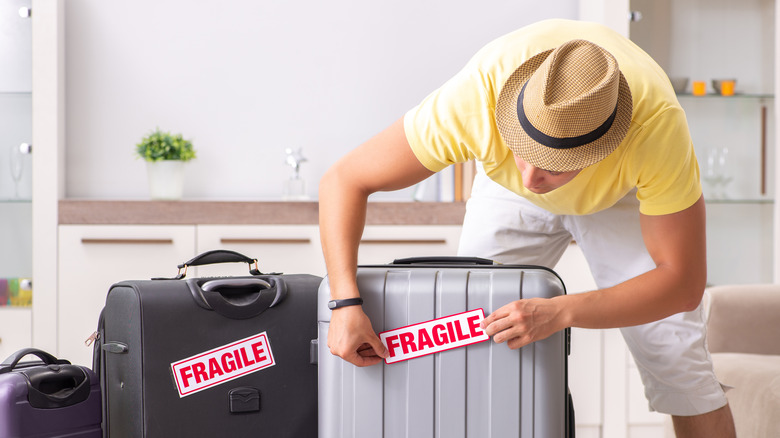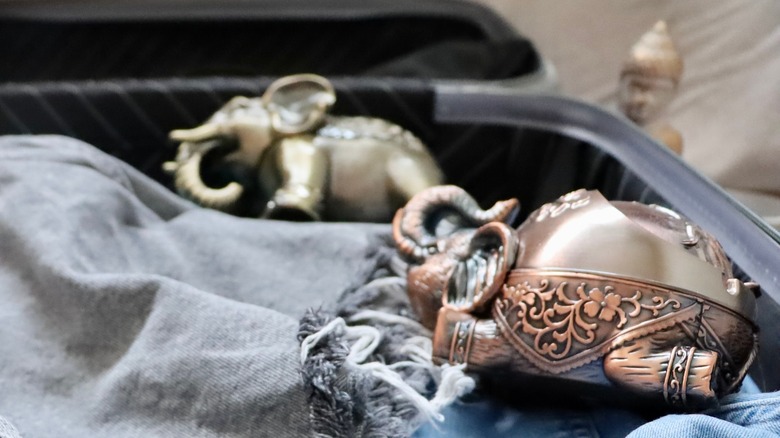10 Items You Should Never Pack In Your Checked Luggage
Arriving at your destination only to find that a valuable gadget has vanished, your favorite shirt is ruined, or your much-needed medication was destroyed en route is definitely not a desired travel experience. Yet it happens more often than most travelers realize. In fact, every year, the Transportation Security Administration (TSA) confiscates personal property and reports damage to thousands of checked bags containing restricted, fragile, or irreplaceable items.
Of course, checking a bag is convenient and ideal when it comes to bulky gear or extra stuff, but the cargo hold is far from forgiving. From drastic temperature shifts to turbulence or rough handling during boarding, there's a greater chance your belongings will be lost or damaged. Items such as lithium batteries or aerosol sprays also pose serious safety risks for everyone on board. Other travel must-haves — such as jewelry, electronics, or vital documents — simply don't belong out of your sight. So before you zip up your suitcase, it is worth taking a closer look.
Not only does this guide draw on the Federal Aviation Administration (FAA) and TSA regulations, but it also offers practical advice from seasoned travelers to help you avoid common packing mistakes. Knowing what to have in tow and what not to bring in your checked suitcase could save you from delays, confiscations, and possible heartbreak at baggage claim. Without further ado, here are the 10 items you should never pack in your checked luggage.
Lithium batteries and power banks
When it comes to items travelers unknowingly pack in their checked bags, lithium-ion and lithium-metal batteries are some of the most common — and most hazardous. These batteries power everyday essentials such as laptops, cameras, e-cigarettes, portable power banks, and even electric toothbrushes, but they carry a significant fire risk if they are damaged, crushed, or exposed to extreme temperature changes. Inside the cargo hold, baggage is stacked tightly, shifted during loading, and exposed to fluctuating pressure. If a lithium battery short-circuits or overheats under these conditions, it can trigger what's known as thermal runaway — a fast-spreading fire that is extremely difficult to detect or extinguish once the plane is airborne.
Since the airplane cargo hold is not monitored as closely as the cabin, even a small battery fire can quickly escalate. This is why the FAA and TSA strictly prohibit spare lithium batteries and power banks in checked luggage. The cabin, on the other hand, is equipped with fire-suppression tools and a trained crew who can respond immediately if a device overheats or smokes. To fly safely, you should always pack spare batteries and power banks in your carry-on bag and ensure they're stored properly — ideally in a protective case to prevent accidental activation. If a battery-powered device can't be removed or is built-in, make sure it is fully powered off before flying.
Electronics containing lithium batteries (laptops, tablets, cameras)
Most electronic devices — such as laptops, tablets, cameras, handheld gaming systems, and smartwatches — can technically be placed in checked luggage if fully powered off, but experts strongly discourage this practice. These devices rely on lithium-ion batteries — the same type that can overheat and ignite if damaged, compressed, or exposed to extreme atmospheric shifts. As with power banks and other lithium-powered items, things can go wrong without anyone there to intervene.
Beyond safety concerns, placing electronics in checked luggage increases the risk of loss or theft. Checked bags are routinely stacked, tossed, scanned, and transported through multiple handling points — creating countless opportunities for impact damage or for items to quietly disappear. It's also worth noting that many airlines or travel insurance policies do not fully reimburse travelers for lost electronics. Additionally, when it comes to delicate electronics, pressure and temperature changes in the cargo hold can damage internal components, screens, and other sensitive components. As a result, it is strongly recommended that you carry your devices in your hand luggage to maintain control over their condition, security, and accessibility throughout your trip. Doing so, especially comes in handy if your checked luggage ends up being delayed or rerouted.
Valuables (jewelry, watches, cash)
Similarly, valuable personal items such as jewelry, luxury watches, cash, and small designer accessories should never be placed in checked luggage. While many travelers assume airline baggage systems are secure, luggage theft, mishandling, and misrouting happen far more frequently than expected — especially during tight connections or at large international airports. Once a checked bag leaves your hands, it passes through multiple checkpoints, creating several opportunities for items to be tampered with or removed without immediate detection.
Airlines also do not take financial responsibility for high-value personal belongings stored in checked baggage. In fact, most carriers explicitly state in their policies that they will not reimburse travelers for jewelry, electronics, cash, or heirloom-quality items — even if the airline loses the bag entirely. Travel insurance may also deny claims if valuables were placed in checked luggage instead of being kept on your person, leaving travelers with no recourse. Keeping valuables in your carry-on ensures that you maintain control and visibility at all times. You can store them in a zippered pouch, inside an interior compartment, or even in a handbag or backpack — for added privacy and convenience. For especially expensive or sentimental items, consider wearing them or carrying them close to your body rather than packing them at all.
Medications and medical devices
Yet another packing mistake travelers should avoid at all costs is placing essential medications and medical devices in their checked luggage. Instead, keep these essentials in your carry-on or approved personal item. If your suitcase is delayed, rerouted, or lost, you could be left without the medication you rely on for daily health, pain management, or even life-saving emergencies. Medications such as insulin, EpiPens, inhalers, blood pressure medication, antidepressants, or heart medication are not easily replaced while traveling, and pharmacies in other regions or countries may require new prescriptions or doctor verification before dispensing refills.
Temperature is another critical factor. The cargo hold of an aircraft is not consistently temperature-controlled. Temperatures can drop dramatically at altitude or rise during extended time on the tarmac. Many medications, especially liquid and injectable prescriptions, can lose their effectiveness or spoil when exposed to extreme heat or cold. And though it may be tempting to put medical devices such as glucose monitors, CPAP machines, and auto-injectors in your checked bag, so you are not weighed down as you make your way through the airport, it is better to be safe rather than sorry. By keeping medical devices with you, you can access them whenever needed. Along those same lines, medications are best kept in your carry-on and in their original labeled packaging for easy access, guaranteed freshness, and to help ensure smooth passage through airport security.
Essential travel documents (passports, IDs, itineraries)
Other personal belongings, such as your passport, ID, travel reservation, and important paperwork, should never be placed in checked luggage. Not only is there a real possibility that your checked bag will be delayed or lost, but not having these items readily available or on your person could also mean that you are unable to board your next flight, check into a hotel, clear immigration, rent a car, or even prove your identity. What's more, recovering or replacing these documents abroad can be time-consuming, stressful, and expensive, often involving visits to embassies, police reports, or lengthy verification processes that can disrupt or cancel your trip entirely.
Also, passports and identification cards are prime targets for theft. Checked luggage passes through multiple handling points where bags are opened, scanned, stored, and moved by different airport and airline personnel. Once out of your sight, travel documents inside your suitcase become far more vulnerable to theft or tampering. Even secure locks don't guarantee protection, as standard TSA-approved locks can be easily opened during routine inspections. And since travel plans can change on a dime, having your passport and itineraries on hand ensures you can adjust accordingly in real time — whether it is a delayed flight, a last-minute side quest, or an emergency. In general, for peace of mind and travel preparedness, carrying your documents in a secure, easily reachable pouch, wallet, or inside pocket, is an absolute must.
Aerosols and flammable items
Aerosol sprays and flammable liquids may seem harmless in everyday life, but they can become dangerous when packed in checked luggage. Products such as hair sprays, spray deodorants, self-tanners, household cleaners, and certain disinfectants are stored under pressure. Changes in altitude and temperature can cause those pressurized containers to expand. If they rupture or leak, the contents can ignite or create harmful fumes. For this reason, the FAA strictly regulates which aerosol products are allowed on airplanes.
Typically, only small travel-size personal-care aerosols (like dry shampoo or travel deodorant) may be permitted, and even then, they must be packed with caps securely fastened to prevent accidental discharge. In contrast, most flammable liquids —from lighter fluid to rubbing alcohol and beyond — are outright banned from being stored in a checked bag. Packing aerosols (improperly) and prohibited flammable liquids in this instance can result in confiscation, delays, fines, and a potential host of problems. It is also worth noting that if such items accidentally cause damage to other passenger's belongings, you may be held responsible. So, in order to stay safe and compliant, it is highly recommended that you always review your specific airline's and the FAA's hazardous materials guidelines before you fly. And when possible, opt for solid or non-pressurized alternatives — or simply purchase these items once you reach your destination.
Fragile items (glass, souvenirs, perfume bottles)
More often than not, fragile items such as glassware, ceramic souvenirs, decorative bottles, or perfume don't survive the journey when packed in checked luggage. Once your suitcase is out of your hands, it moves through conveyor belts, sorting facilities, cargo loaders, and baggage carts — being stacked, tossed, or compressed under heavier bags. Even if you wrap these belongings carefully, the repeated impact and shifting weight can easily shatter delicate materials.
In addition to rough handling, pressure and temperature changes can cause glass and sealed containers to expand, weaken, or crack. Perfume bottles, snow globes, and artisanal jars are particularly vulnerable. If they break or leak, they can damage clothing, electronics, and other items in your suitcase. Airlines also clearly state that they offer limited or no liability for fragile items placed in checked luggage, meaning you likely won't receive reimbursement if something breaks. Thus, to protect delicate souvenirs and personal treasures, pack them in your carry-on instead. Tuck them securely in the center of your bag, cushioned with soft clothing or a padded travel pouch. Keeping these breakable items with you not only prevents damage but also ensures that irreplaceable mementos make it home intact — whether they came from a local market, a gift shop, or a special celebration abroad.
Perishable food and liquids
It is no secret that perishable foods such as dairy, meat, seafood, and certain homemade dishes may seem convenient to pack when traveling, especially when returning with regional specialties or carrying snacks for your trip. However, these items should never be packed in checked luggage. Not only can food quickly spoil in checked luggage, but it can also break down, leak, rot, and create strong odors — potentially contaminating not only your belongings but also neighboring luggage. In extreme cases, spoiled food can attract pests or cause your suitcase to be flagged for inspection and disposal.
Liquids present a separate but equally serious problem. Any container over 3.4 ounces may be confiscated depending on the country's security regulations, and even permitted liquids can leak if air pressure causes lids to loosen or bottles to crack. Soups, sauces, and beverages stored in glass or thin plastic containers are particularly vulnerable. A single spill can ruin clothing, stain fabrics, and damage electronics or paper items in your bag.
As a rule of thumb, then, it's best to avoid packing perishable foods and large liquid items altogether. If you can't leave your destination without bringing back a few edible gifts or local delicacies, you may want to consider shelf-stable, sealed, or commercially packaged products that can withstand atmospheric changes while traveling. And when in doubt, keep snacks and dry goods in your carry-on so you can monitor them and prevent unnecessary mess or spoilage.
Irreplaceable sentimental items
Items that carry emotional value should always travel with you, never in your checked bag. This includes important belongings such as heirlooms, keepsakes, jewelry, or mementos from loved ones should be kept in a secure place on your person — you can even use a plastic straw to help protect your jewelry while traveling. Since the value of sentimental belongings cannot be measured or replaced, a lost suitcase could mean heartbreak that no refund can fix. And even though airlines may reimburse travelers for lost or damaged baggage, the available compensation is often limited and typically based on the declared value of the property.
Moreover, checked luggage generally moves through multiple handling points, conveyor systems, and storage areas, which only increases the chances of misrouting, theft, or accidental damage. As a result, even when bags are eventually located and returned, the contents are not always intact. Fragile keepsakes may break in transit, and smaller objects can shift, become loose, or inexplicably disappear during inspection. But when you opt to keep these items in your personal bag, you can keep a watchful eye on them throughout your journey. If you must bring something deeply meaningful on your getaway, store it securely in a padded pouch or a zippered compartment close to your body.
Keys and small everyday essentials
After packing all your TSA- and FAA-approved belongings in the right suitcase, you might think any extra items, such as your keys, chargers, and other small essentials, just need to be stowed away somewhere — anywhere you still have room. But the truth is, packing your keys or phone charger in your checked luggage can create major problems the moment you land. If your suitcase is delayed or misplaced, you could find yourself stranded at the airport, unable to start your car, unlock your home, or recharge your phone to call for help. These everyday necessities are the types of items travelers often forget they will need immediately after a flight — until it's too late.
Even with the utmost care, small items tucked into a suitcase can easily slip out, break open, or get lost during inspection. Alternatively, if your bags arrive safely, you may still struggle to find keys, cables, and other essentials that have been buried deep inside or dislodged during a long flight. So, why not do yourself a favor and keep essentials in your carry-on or personal bag to avoid having to unpack at baggage claim? Ultimately, anything you might need immediately upon arrival should be within arm's reach to help streamline your entire travel experience.
Methodology
To identify the most important items travelers should never pack in their checked luggage, Transportation Security Administration and Federal Aviation Administration safety and security regulations were thoroughly reviewed. Strict guidelines regarding hazardous materials, restricted electronics, and personal items that can pose safety, theft, or loss risks when placed in the cargo hold clearly outline what passengers can pack. Additionally, insights from major airlines, travel insurance providers, and consumer protection sources, including CNBC Travel and Consumer Reports, were vital in determining where other items and travel essentials should go. Taken all together, both regulatory compliance and real-world traveler experiences were assessed. Finally, updates from recent news reports and airline policy changes were cross-referenced to ensure accuracy as of 2025, allowing travelers to confidently pack their bags based on practical, evidence-based recommendations.


